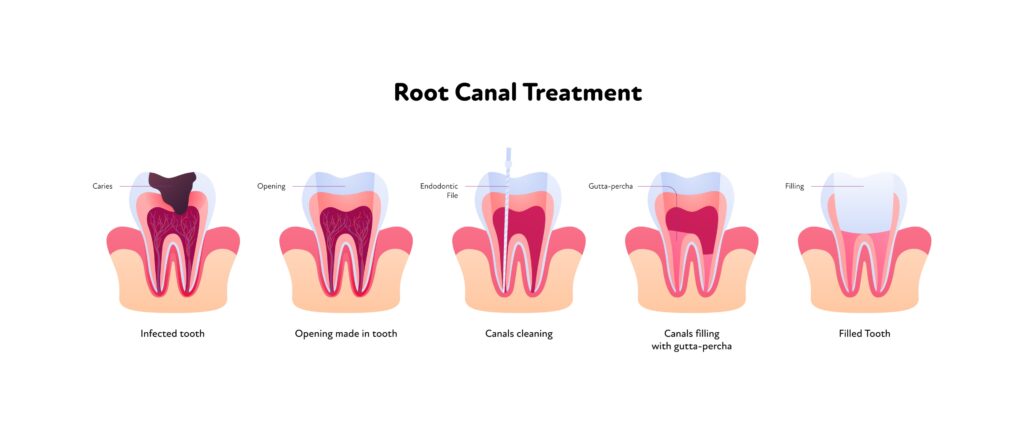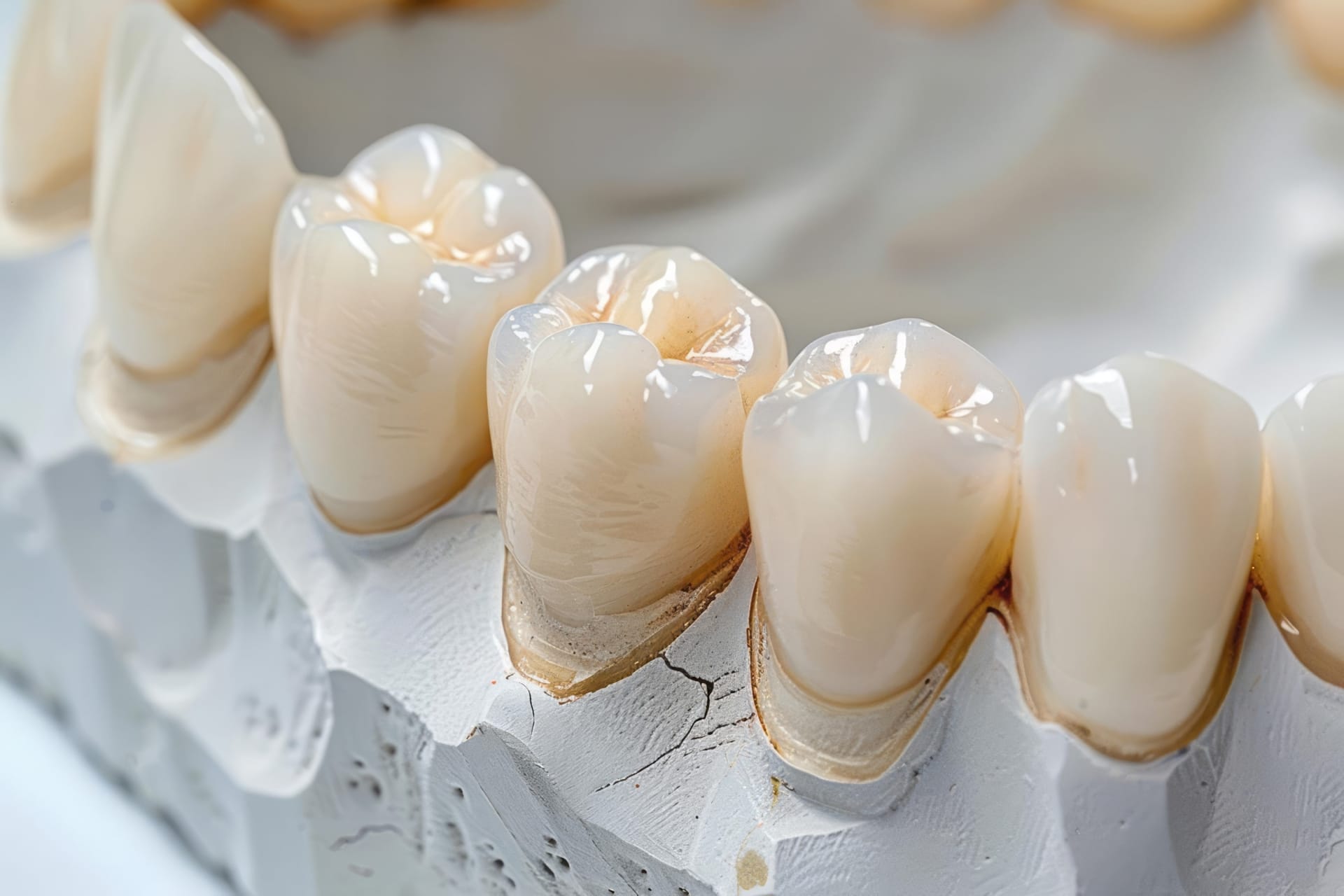Are you experiencing tooth pain and wondering if a root canal treatment is in your future? You’re not alone. This common yet crucial procedure is designed to eliminate infected pulp and restore the health of your tooth. In this blog, we’ll take you on a journey through the entire root canal process—what to expect during the treatment, the significant benefits of preserving your natural tooth, and essential recovery tips to ensure a smooth healing experience. Whether you’re facing discomfort or simply seeking to understand more about this vital dental procedure, we’re here to guide you every step of the way.
Key Takeaways
- Root canal treatment is a safe and specialized procedure aimed at removing infected pulp to preserve natural teeth and prevent future infections.
- Common signs that indicate the need for a root canal include persistent toothache, sensitivity to temperature, dental abscesses, and visible discoloration of the tooth.
- Post-treatment care is essential for recovery; it includes managing discomfort, eating soft foods, and potentially restoring the tooth with a crown.
At Northern Westchester Dental Care, we understand how distressing tooth pain can be, and we’re here to help. If you’re experiencing discomfort or have questions about root canal treatment, don’t hesitate to reach out to our team of experienced dental professionals. Schedule a consultation today, and let us guide you toward a healthier smile with personalized, compassionate care tailored to your needs.
👉Also Read: How to Choose the Best Cosmetic Dentist in Yorktown Heights, NY?
What is Root Canal Treatment?
A root canal treatment is a specialized dental procedure designed to remove the infected pulp from within a tooth, clean and disinfect the area, and then seal it to prevent future infections.
This treatment becomes necessary when the pulp, which contains nerves and blood vessels, becomes inflamed or infected due to:
- Deep decay
- Repeated dental procedures
- Faulty crowns
- Cracks in the tooth
The main objective of root canal treatment is to remove bacteria from the infected root canal. Additionally, it aims to prevent reinfection and preserve the natural tooth. Despite common misconceptions, root canal treatment is considered a safe procedure and is performed by endodontists who specialize in saving infected teeth. These specialists use advanced technology to ensure precision and comfort during the procedure.
Once the infected pulp is removed and the tooth is sealed, it continues to be nourished by the surrounding tissues, maintaining its function and appearance. This not only alleviates pain but also prevents further complications, making root canal therapy an essential treatment for preserving your natural teeth.
Signs You Need a Root Canal
Persistent toothache, especially when eating or biting down, is often a clear sign that you might need a root canal. This lingering pain can be a result of an infected or inflamed pulp, which if left untreated, can lead to more severe dental issues. Similarly, sensitivity to hot and cold that lasts for an extended period suggests potential nerve damage and that your tooth hurts, indicating the need for a root canal.
Another indicator is the presence of a pimple-like bump on the gums, known as a dental abscess. This bump signifies a severe tooth infection that requires immediate treatment, possibly through a root canal. Swelling in the face or jaw, particularly if it involves the gums, can also be a strong sign of an infection that may necessitate a root canal.
A chipped or cracked tooth not only causes discomfort but can also lead to an infected tooth, indicating the need for a root canal. Additionally, severe tooth discoloration, such as a darkened tooth, can point to deep decay or internal tissue breakdown, further emphasizing the need for this treatment.
Sometimes, even without pain, damage to the tooth’s pulp can occur, necessitating a root canal. Regular dental checkups are crucial for early detection and prevention of such issues, ensuring that your teeth remain healthy and free from infection.
The Root Canal Procedure: Step-by-Step

Understanding the root canal procedure can help alleviate any anxiety you might have. The process generally involves three main steps: diagnosis and preparation, cleaning and shaping the canals, and finally, filling and sealing the tooth. Each of these steps is crucial to ensure a successful treatment outcome.
Diagnosis and Preparation
During the initial consultation, your dentist will review prior X-rays and conduct a visual inspection of the affected tooth to understand the extent of the infection. These dental X-rays are essential for evaluating the necessity of root canal treatment and planning the procedure effectively.
Before the procedure begins, a local anesthetic is administered to numb the affected area, although this may not be necessary if the tooth lacks sensitivity. To keep the tooth dry and free from saliva, a dental dam is placed around it, ensuring a clean environment for the treatment.
Cleaning and Shaping the Canals
Once the diagnosis and preparation are complete, the next step is to clean and shape the canals. The dentist starts by removing the infected pulp from the tooth and its roots using specialized tools. This step is crucial to eliminate bacteria and prevent further infection.
The root canal space is then cleaned and widened with small files, followed by irrigation to remove any debris. This meticulous cleaning process ensures that all infected material is removed, preparing the canal for filling. The complexity of this process can vary based on the number of roots and canals in the tooth, which sometimes adds to the procedure’s duration.
Filling and Sealing the Tooth
After cleaning, the root canal is filled with gutta-percha, a biocompatible material that helps prevent future infections. Gutta-percha is favored for its compatibility with human tissue, making it an ideal choice for this procedure.
Temporary fillings are used to seal the tooth between appointments after the cleaning and shaping phase. This temporary seal protects the cleaned canals from reinfection until a permanent restoration can be placed.
The final step involves sealing the tooth to ensure it remains protected until a crown or permanent filling is applied.
Post-Treatment Care
After your root canal treatment, taking proper care of the treated tooth is essential for a smooth recovery. Eating soft foods is advisable to avoid discomfort and prevent damage to the treated area. This dietary adjustment helps minimize any potential pain and allows the tooth to heal properly.
Managing discomfort and swelling can be achieved by taking prescribed pain relief medication. This step is crucial for ensuring that your recovery is as pain-free as possible.
Additionally, restoring the tooth with a crown or filling strengthens it and restores its natural appearance, ensuring it functions correctly and looks good.
Recovery Time and Expectations
Recovery from a root canal typically takes about two to three days, with most pain-reducing within one to two days after the procedure. During this period, a temporary filling is placed to protect the tooth until a permanent restoration can be completed. A crown may be recommended post-treatment to protect the tooth from fractures.
Avoiding physical activities that could lead to a blow to the face is important for a smooth recovery. If swelling or pain persists beyond a couple of days, it’s advisable to contact your dental professional for further guidance.
Preventing Future Root Canal Treatments
Maintaining good oral hygiene is crucial for preventing the need for future root canal treatments. This involves brushing twice daily and regular flossing to remove plaque. Routine dental visits help in the early detection of potential dental issues, preventing complications that may require a root canal.
Addressing dental problems promptly can stop them from escalating to a level that necessitates a root canal. Additionally, leading a healthy lifestyle, including a balanced diet and avoiding tobacco, plays a crucial role in maintaining oral health and preventing root canals.
Cost of Root Canal Treatment
The cost of root canal treatment can vary based on several factors, including the complexity of the procedure and the specific location of the tooth. Molars generally require more intricate treatment than front teeth, which can influence the overall cost.
Additional treatments, such as crowns, may be necessary after a root canal, contributing to the overall cost. Diagnostic procedures like X-rays before a root canal can also add to the total expenses.
At Northern Westchester Dental Care, we recognize that not everyone has access to dental insurance. To support our patients and their families without coverage, we’ve created the NWDC Membership Plan. Please note that this plan is not dental insurance; instead, it offers a budget-friendly way to prioritize your dental care.
How Root Canal Treatment Saves Your Tooth
Root canal treatment is a common and effective procedure, with over 15 million performed annually in the U.S. This prevalence underscores its importance in dental health. The procedure alleviates tooth pain and prevents further dental complications by removing the infected pulp and eliminating sources of infection.
By saving a natural tooth through root canal treatment, you prevent potential complications like abscesses and bone loss. This treatment helps maintain the function of natural teeth, which are essential for chewing and speech. Additionally, preserving the original tooth maintains its natural appearance and feel, which prosthetic replacements can’t match.
Overall, root canal treatment benefits oral health by helping maintain a natural smile, allowing you to eat your favorite foods, and limiting the need for ongoing dental work.
Common Myths About Root Canals
Despite its benefits, the root canal procedure is often surrounded by myths. One common myth is that root canals are extremely painful. While the procedure can be uncomfortable, modern techniques and anesthesia minimize pain, making the experience similar to getting a filling.
Another myth is that root canals remove the entire tooth. In reality, only the pulp inside the tooth is removed, while the roots remain intact. These misconceptions often lead to unnecessary anxiety, but understanding the facts can help alleviate fears.
Alternatives to Root Canal Treatment
While root canal treatment is generally preferable for preserving the natural tooth, there are alternatives, such as tooth extraction. However, extraction can lead to further dental issues, such as shifting teeth, which may necessitate additional procedures like bridges or implants.
Choosing extraction can be more uncomfortable and painful than the root canal procedure itself. It also often requires more expensive and time-consuming follow-up treatments. Therefore, it’s important to weigh the benefits of preserving the natural tooth against the potential need for replacement if extraction occurs.
👉Also Read: Fast and Reliable Emergency Tooth Extraction Westchester County: Your Pain Relief Solution
Choosing the Right Endodontist in Northern Westchester
Choosing a qualified endodontist is crucial for effective root canal treatment and overall dental health. Endodontists possess specialized training, which enhances treatment effectiveness and ensures a higher success rate. At Northern Westchester Dental Care, we pride ourselves on our board-certified endodontist, who is dedicated to providing top-notch care in a comfortable and welcoming environment.
Our practice combines state-of-the-art equipment with a compassionate approach, ensuring that you receive the best possible care tailored to your needs. We understand that undergoing a root canal can be a daunting experience, which is why we strive to make every visit as stress-free as possible.
Experience Exceptional Dental Care—Get Started Today!
If you’re experiencing tooth pain or have questions about root canal treatment or other endodontic procedures, don’t hesitate to reach out to our team at Northern Westchester Dental Care. We’re here to guide you through every step of your dental journey with personalized, compassionate care tailored to your unique needs.
In addition to root canal treatments, we offer a comprehensive range of services, including family dentistry, orthodontics, emergency dentistry, sedation dentistry, cosmetic procedures, holistic options, and more. Schedule your consultation today by calling us at 914-245-3103, and take the first step towards a healthier, more confident smile!




